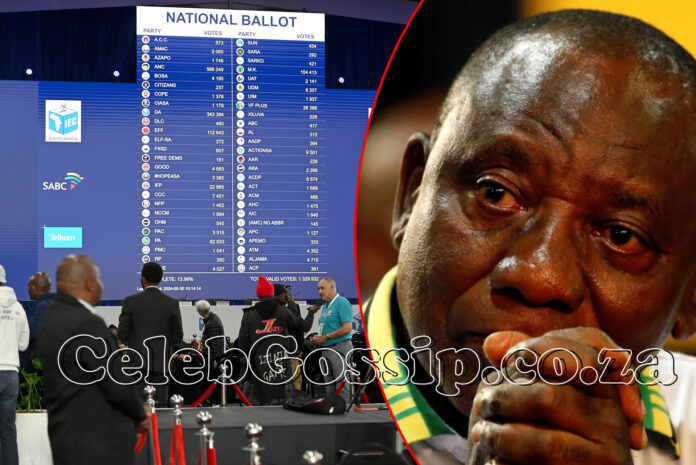It was a race against time, with tensions running high and negotiations teetering on the edge of collapse. South Africa's highly anticipated Government of National Unity (GNU) came perilously close to derailment due to two contentious issues and an unfortunate spelling error. After two weeks of intense discussions, the Democratic Alliance (DA) and the African National Congress (ANC) reached an agreement on Thursday night, only to face a last-minute hurdle that threatened the entire process.
In the early hours of Friday morning, President Cyril Ramaphosa sent back the final version of the agreement to the DA, and that's when the cracks began to show. Two significant changes in the document became sticking points that threatened to unravel the delicate compromise. The first change removed the requirement for the president to consider the "broad proportionality" of parties in the GNU's representation in the National Assembly when appointing Cabinet posts. The second change lowered the threshold for "sufficient consensus" on government decisions and policies from 60% to 50% of voter support represented by the GNU parties in the Assembly.
The consequence of these alterations became apparent. If the threshold for "sufficient consensus" remained at 50%, the ANC could comfortably push through policies without the support of the DA, given their respective voter support percentages. The DA received the revised version just a few hours before the swearing-in of the National Assembly's first MPs, and they refused to sign the modified agreement, reigniting negotiations at a critical juncture.
The clock was ticking, and if no consensus was reached by 1 pm, the DA had the option to nominate its own candidate for Speaker, potentially shutting the ANC out of the government with the support of other opposition parties. The stakes were high, and the negotiations resumed, leaving the nation on edge.
Chief Justice Raymond Zondo had already begun swearing in MPs when, at 11:30 am, the ANC finally conceded to the DA's demand to raise the threshold for "sufficient consensus" back to 60% and agreed that the allocation of Cabinet posts would consider the parties' number of seats in the Assembly. The agreement was on the verge of being signed when a spelling error was discovered, leading to yet another modification, the 18th in total.
Finally, at 12:15 pm, the document was signed, paving the way for the election of Thoko Didiza as Speaker, Annelie Lotriet as deputy Speaker, and Ramaphosa as president. The ANC's Mdumiseni Ntuli became Parliament's chief whip, marking a significant milestone in the formation of the GNU.
This is how the ministries will be divided among the parties. The DA is set to receive six ministerial positions and four deputy minister positions, while the Inkatha Freedom Party (IFP) is expected to secure two ministerial positions and possibly one deputy minister position. The specifics of the chairpersons of the portfolios are yet to be finalized.
The agreement also extends to provincial legislatures, with the IFP obtaining three MEC positions in KwaZulu-Natal, aligning with their premiership of the province. The ANC, as the third-largest party in KwaZulu-Natal, will also receive three MEC positions, while the remaining MEC portfolios will be distributed among other parties, including the DA and the National Freedom Party.
Insiders reveal that the distribution of positions in Gauteng will follow a different pattern, with the ANC expected to secure more positions, followed by the DA, and a smaller allocation for the IFP.
Throughout the negotiations, both parties deployed influential figures to their teams. The ANC was led by Secretary-General Fikile Mbalula, former Gauteng Premier David Makhura, Fébé Potgieter-Gqubule, and former Deputy Justice Minister Andries Nel. The DA's negotiating team consisted of Helen Zille, Siviwe Gwarube, Western Cape Premier Alan Winde, Ivan Meyer, former party leader Tony Leon, and strategist Ryan Coetzee.
The road to this historic GNU was not without its challenges. Informal talks between the DA and ANC supporters of Ramaphosa had already begun shortly after the general election. The parties communicated through an intermediary, with the DA expressing interest in specific Cabinet posts, excluding key positions like Minister of Finance or Social Development. The DA also sought important portfolio committee chairmanships and the position of Deputy Speaker of the National Assembly.
However, Ramaphosa faced an uphill battle when presenting the idea of cooperating with the DA to his party's National Executive Committee (NEC). Despite his efforts, the NEC initially rejected the proposal, leading to the eventual compromise of a GNU.
The negotiations were marked by intense shuttle diplomacy between the two parties, with the DA adopting a firm stance: "No document, no agreement." The timeline of events reveals the tense progression of discussions, with the ANC and DA negotiators meeting for the first time onJune 1st to initiate talks and finalize the GNU agreement on June 14th, just hours before the swearing-in of MPs.
The formation of a Government of National Unity in South Africa has been met with mixed reactions from the public. Supporters of the ANC see it as a necessary step toward stability and inclusivity, while some within the party express concerns about compromising their ideals and policies. On the other hand, the DA's decision to enter into a coalition with the ANC has drawn criticism from some of their traditional supporters, who view it as a betrayal of their principles.
The success of the GNU will depend on the ability of the ANC and the DA to work together effectively, overcome their ideological differences, and prioritize the interests of the country. The challenges they face are substantial, with issues such as corruption, economic recovery, and social inequality requiring urgent attention.











